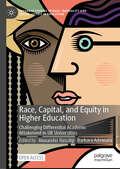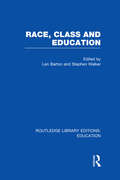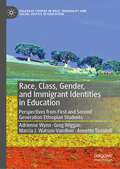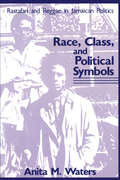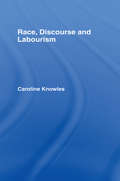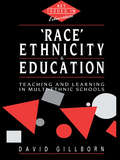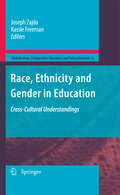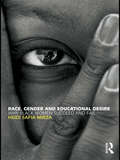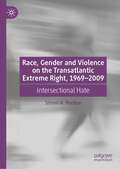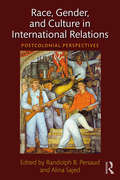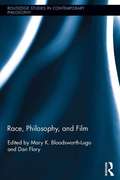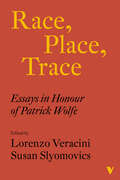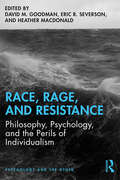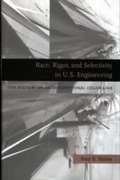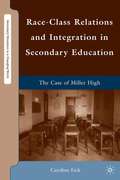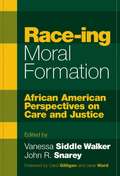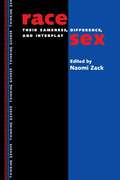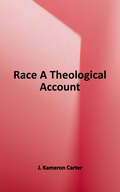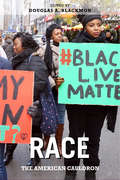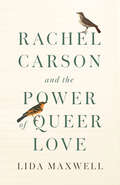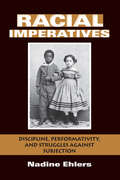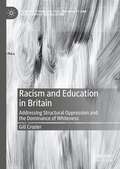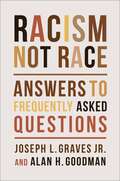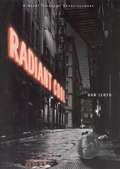- Table View
- List View
Race, Capital, and Equity in Higher Education: Challenging Differential Academic Attainment in UK Universities (Palgrave Studies in Race, Inequality and Social Justice in Education)
by Alexander Hensby Barbara AdewumiThis book examines the structural and cultural factors that explain the persistence of an attainment gap between white and Black, Asian, and Minority Ethnic (BAME) students in UK universities. So-called ‘deficit’ approaches have long represented the orthodoxy in higher education strategy-making, yet they overlook the structural and institutional factors that reproduce attainment gaps. Whereas students already in possession of the right ‘academic capital’ are made to feel validated and empowered in their learning, BAME students – particularly those from working class backgrounds – may feel marginalised by dominant hierarchical cultures on campus.This book provides an important and unique contribution to the study of racial equity in higher education. Its chapters provide a breadth and depth of analyses which help explain the roots of the attainment gap, while offering reflections and commentaries on the necessary steps that universities must take in order to ensure equityfor students from all backgrounds.
Race, Class and Education (Routledge Library Editions: Education)
by Stephen Walker Len BartonOne problem which continues to absorb social scientists is the way in which so much social deprivation stems from racial or class status. The discussion in this book is developed in two ways: firstly, careful attention is given to an examination of the way minority groups create and maintain collective identities and action. Secondly, the relationship between this movement and such topics as racism in schools, schooling, unemployment and West Indian involvement in sporting rather than academic activities is analysed, together with the nature of the educational experience of different class and gender groups.
Race, Class, Gender, and Immigrant Identities in Education: Perspectives from First and Second Generation Ethiopian Students (Palgrave Studies in Race, Inequality and Social Justice in Education)
by Greg Wiggan Marcia J. Watson-Vandiver Adrienne Wynn Annette TeasdellThis volume addresses the underlying intersections of race, class, and gender on immigrant girls’ experiences living in the US. It examines the impact of acculturation and assimilation on Ethiopian girls’ academic achievement, self-identity, and perception of beauty. The authors employ Critical Race Theory, Critical Race Feminism, and Afrocentricity to situate the study and unpack the narratives shared by these newcomers as they navigate social contexts rife with racism, xenophobia, and other forms of oppression. Lastly, the authors examine the implications of Ethiopian immigrant identities and experiences within multicultural education, policy development, and society.
Race, Class, and Political Symbols: Rastafari and Reggae in Jamaican Politics
by Anita M. WatersDr. Waters is one of a new breed of analysts for whom the interpenetration of politics, culture, and national development is key to a larger integration of social research. Race, Class, and Political Symbols is a remarkably cogent examination of the uses of Rastafarian symbols and reggae music in Jamaican electoral campaigns. The author describes and analyzes the way Jamaican politicians effectively employ improbable strategies for electoral success. She includes interviews with reggae musicians, Rastafarian leaders, government and party officials, and campaign managers. Jamaican democracy and politics are fused to its culture; hence campaign advertisements, reggae songs, party pamphlets, and other documents are part of the larger picture of Caribbean life and letters. This volume centers and comes to rest on the adoption of Rastafarian symbols in the context of Jamaica's democratic institutions, which are characterized by vigorous campaigning, electoral fraud, and gang violence. In recent national elections, such violence claimed the lives of hundreds of people. Significant issues are dealt with in this cultural setting: race differentials among Whites, Browns, and Blacks; the rise of anti-Cubanism; the Rastafarians' response to the use of their symbols; and the current status of Rastafarian ideological legitimacy.
Race, Discourse and Labourism (International Library of Sociology)
by Caroline KnowlesRace, Discourse and Labourism argues that the commonwealth of socialism is founded upon a well-concealed history of brutality and repression. Caroline Knowles details the historical conditions of the emergence of race through Labour's dealings with Indian independence negotiations and anti-semitism in the thirties, and the effects of this on the conceptions of black citizenship, multi-racialism and black representation in labour politics.
Race, Ethnicity and Education: Teaching and Learning in Multi-Ethnic Schools (Key Issues in Education)
by David GillbornThis book is a major new investigation into the issues of 'race', ethnicity and education, following the educational reforms during the late 1980s. It provides an up-to-date and critical introduction to current issues and major research findings in the field, exploring the teacher-pupil relationship through a detailed account of life in an inner-city comprehensive. It reveals the influence of different racist stereotypes and highlights the especially disadvantaged position of Afro- Caribbean pupils within a school. Features: * Draws on a wide variety of research projects in ethnic schools to examine: achievement; curriculum content; language use; assessment and testing under the National Curriculum * Uses material collected during two years of research to consider young people's school experiences and issues relating to classroom discipline.
Race, Ethnicity and Gender in Education: Cross-cultural Understandings
by Joseph Zajda Kassie FreemanThis, the sixth volume in Springer's Globalisation, Comparative Education and Policy Research series, presents scholarly research on major discourses of race, ethnicity and gender in education. It is a sourcebook of ideas for researchers, practitioners and policy makers in education, globalisation, social justice, equity and access in schooling around the world. The aim of the book is to provide an easily accessible, practical yet scholarly source of information about issues of international concern in the field of globalisation and comparative education. Readers will also find here the very latest thinking on race, ethnicity and gender in the context of global culture. Editors Zajda and Freeman have compiled perspectives on education and policy research that are relevant to progressive pedagogy, social change and transformational educational reforms in the 21st century. The book critically examines the interplay between state, ideology and current discourses of race, ethnicity and gender in the global culture. It draws on recent research in the areas of globalisation, equity, social justice, and the role of the State. The authors also explore conceptual frameworks and methodological approaches that could be applied to research covering the State, globalisation, race, ethnicity and gender, and analyze existing inequalities due to race, ethnicity and gender and resultant social stratification. Finally, the book demonstrates the neo-liberal ideological imperatives of education and policy reform, affecting race, ethnicity and gender, and illustrates the way the relationship between the State and education policy affects current trends in education policy as well as reforms in the fields of race, ethnicity and gender.
Race, Gender and Educational Desire: Why black women succeed and fail
by Heidi Safia Mirza'This book is a great genealogy of black women's unrecognised contributions within both education and the wide social context. I think it constitutes an important piece of work that is totally missing from the existing literature' - Diane Reay, Professor of Education, Cambridge University Race, Gender and Educational Desire reveals the emotional and social consequences of gendered difference and racial division as experienced by black and ethnicised women teachers and students in schools and universities. It explores the intersectionality of race and gender in education, taking the topic in new, challenging directions and asking How does race and gender structure the experiences of black and ethnicised women in our places of learning and teaching? Why, in the context of endemic race and gender inequality, is there a persistent expression of educational desire among black and ethnicised women? Why is black and ethnicised female empowerment important in understanding the dynamics of wider social change? Social commentators, academics, policy makers and political activists have debated the causes of endemic gender and race inequalities in education for several decades. This important and timely book demonstrates the alternative power of a black feminist framework in illuminating the interconnections between race and gender and processes of educational inequality. Heidi Safia Mirza, a leading scholar in the field, takes us on a personal and political journey through the debates on black British feminism, genetics and the new racism, citizenship and black female cultures of resistance. Mirza addresses some of the most controversial issues that shape the black and ethnic female experience in school and higher education, such as multiculturalism, Islamophobia, diversity, race equality and equal opportunities Race, Gender and Educational Desire makes a plea for hope and optimism, arguing that black women's educational desire for themselves and their children embodies a feminised prospectus for a successful multicultural future. This book will be of particular interest to students, academics and researchers in the field of education, sociology of education, multicultural education and social policy. Heidi Safia Mirza is Professor of Equalities Studies in Education at the Institute of Education, University of London, and Director of the Centre for Rights, Equalities and Social Justice (CRESJ). She is also author of Young, Female and Black (Routledge).
Race, Gender and Violence on the Transatlantic Extreme Right, 1969–2009: Intersectional Hate
by Simon A. PurdueThis book explores the central role that gender has historically played in violent far-right movements and groups, in a time of increasing political polarisation and rising extremism. The author examines the way neo-Nazis and white supremacists have constructed gender, and how this has impacted on the practical role of men and women on the global extreme right between 1969 and 2009, giving valuable insight into the inner workings of the extremist fringe today. In the context of rising violent ultra-nationalism in the UK, Eastern Europe, the USA, India and Russia, this transnational history of racist extremist movements offers a very necessary glimpse into the intimate, personal politics of organised hate, and into the ideological and organisational roots of our current moment. In order to fully understand the extreme right, it is essential to develop an awareness of the deep social foundations that underlie it. By exposing the gendered basis of racist extremism in the USA and UK, this book makes a necessary intervention in the field of far-right studies, shedding new light on the shadowy corners of the political spectrum and ultimately opening new avenues for countering hate on the personal, political and academic level. The book seeks to explain the intricate relationship between organised racist extremism and ideological misogyny, and explores the fundamental contradictions and inconsistencies that underlie women’s far-right activism. Offering historical context to the current social and political moment in which white supremacist and far-right terror presents an immediate threat to security and stability in both the USA and the UK, this book provides useful insights for those researching the history of fascism and the far-right, violent social movements and political activism, as well as women’s history and gender studies.
Race, Gender, and Culture in International Relations: Postcolonial Perspectives
by Randolph Persaud Alina SajedInternational relations theory has broadened out considerably since the end of the Cold War. Topics and issues once deemed irrelevant to the discipline have been systematically drawn into the debate and great strides have been made in the areas of culture/identity, race, and gender in the discipline. However, despite these major developments over the last two decades, currently there are no comprehensive textbooks that deal with race, gender, and culture in IR from a postcolonial perspective. This textbook fills this important gap. Persaud and Sajed have drawn together an outstanding lineup of scholars, with each chapter illustrating the ways these specific lenses (race, gender, culture) condition or alter our assumptions about world politics. This book: covers a wide range of topics including war, global inequality, postcolonialism, nation/nationalism, indigeneity, sexuality, celebrity humanitarianism, and religion; follows a clear structure, with each chapter situating the topic within IR, reviewing the main approaches and debates surrounding the topic and illustrating the subject matter through case studies; features pedagogical tools and resources in every chapter - boxes to highlight major points; illustrative narratives; and a list of suggested readings. Drawing together prominent scholars in critical International Relations, this work shows why and how race, gender and culture matter and will be essential reading for all students of global politics and International Relations theory.
Race, Philosophy, and Film (Routledge Studies in Contemporary Philosophy #50)
by Mary K. Bloodsworth-Lugo Dan FloryThis collection fills a gap in the current literature in philosophy and film by focusing on the question: How would thinking in philosophy and film be transformed if race were formally incorporated moved from its margins to the center? The collection’s contributors anchor their discussions of race through considerations of specific films and television series, which serve as illustrative examples from which the essays’ theorizations are drawn. Inclusive and current in its selection of films and genres, the collection incorporates dramas, comedies, horror, and science fiction films (among other genres) into its discussions, as well as recent and popular titles of interest, such as Twilight, Avatar, Machete, True Blood, and The Matrix and The Help. The essays compel readers to think more deeply about the films they have seen and their experiences of these narratives.
Race, Place, Trace: Essays in Honour of Patrick Wolfe
by Susan Slyomovics Lorenzo VeraciniContinuing Patrick Wolfe&’s work on settler colonialism This edited collection celebrates Patrick Wolfe&’s contribution to the study and critique of settler colonialism as a distinct mode of domination. The chapters collected here focus on the settler-colonial assimilation of land and people, and on what Wolfe insightfully defined as &“preaccumulation&”: the ability of settlers to mobilise technologies and resources unavailable to resisting Indigenous communities. Wolfe&’s militant and interdisciplinary scholarship is thus emphasised, together with his determination to acknowledge Indigenous perspectives and the efficacy of Indigenous resistances.In case studies of Australia, French Algeria, and the United States, contributors illustrate how seminal his contribution was and is. There are three core reasons why it is especially important to develop the field of thinking inaugurated by Wolfe: first, because the demand for Indigenous sovereignty has been crucial to recent struggles against neoliberal attacks in the settler societies; second, because a critique of settler colonialism and its logic of elimination has supported important struggles against environmental devastation; and third, because the ability to think race in ways that are not disconnected from other struggles is now more needed than ever. Racial capitalism and settler colonialism are as imbricated now as they always have been, and keeping both in mind at the same time highlights the need to establish and nurture solidarities that reach across established divides.
Race, Rage, and Resistance: Philosophy, Psychology, and the Perils of Individualism (Psychology and the Other)
by Eric R. Severson Heather Macdonald David M. GoodmanThis timely collection asks the reader to consider how society’s modern notion of humans as rational, isolated individuals has contributed to psychological and social problems and oppressive power structures. Experts from a range of disciplines offer a complex understanding of how humans are shaped by history, tradition, and institutions. Drawing upon the work of Lacan, Fanon, and Foucault, this text examines cultural memory, modern ideas of race and gender, the roles of symbolism and mythology, and neoliberalism’s impact on psychology. Through clinical vignettes and suggested applications, it demonstrates significant alternatives to the isolated individualism of Western philosophy and psychology. This interdisciplinary volume is essential reading for clinicians and anyone looking to augment their understanding of how human beings are shaped by the societies they inhabit.
Race, Rigor, and Selectivity in U.S. Engineering: The History of an Occupational Color Line
by Amy Slaton<p>Despite the educational and professional advances made by minorities in recent decades, African Americans remain woefully underrepresented in the fields of science, technology, mathematics, and engineering. Even at its peak, in 2000, African American representation in engineering careers reached only 5.7 percent, while blacks made up 15 percent of the U.S. population. Some forty-five years after the Civil Rights Act sought to eliminate racial differences in education and employment, what do we make of an occupational pattern that perpetually follows the lines of race? <p>Race, Rigor, and Selectivity in U.S. Engineering pursues this question and its ramifications through historical case studies. Focusing on engineering programs in three settings—in Maryland, Illinois, and Texas, from the 1940s through the 1990s—Amy E. Slaton examines efforts to expand black opportunities in engineering as well as obstacles to those reforms. Her study reveals aspects of admissions criteria and curricular emphases that work against proportionate black involvement in many engineering programs. Slaton exposes the negative impact of conservative ideologies in engineering, and of specific institutional processes—ideas and practices that are as limiting for the field of engineering as they are for the goal of greater racial parity in the profession.</p>
Race-Class Relations and Integration in Secondary Education
by Caroline EickEick explores the history of a comprehensive high school from the world views of its assorted student body, confronting issues of race, ethnicity, class, gender, nationality, and religion. Her case study examines the continuities and differences in student relationships over five decades.
Race-ing Moral Formation: African American Perspectives on Care and Justice
by Vanessa Siddle Walker John R. SnareyIn this volume the editors incorporate the experiences of African Americans into the discourse on moral-development theory and moral education. By citing historical developments from the days of slavery to the present, the authors provide a framework through which one can interpret the way morality has been cultivated amongst Black minorities. Presenting intriguing essays of well-known African American scholars, the editors discuss both the psychology of moral formation among African American children, adolescents, and adults, and the practical implications of this knowledge.
Race/Sex: Their Sameness, Difference and Interplay (Thinking Gender)
by Naomi ZackRace/Sex is the first forum for combined discussion of racial theory and gender theory. In sixteen articles, avant-garde scholars of African American philosophy and liberatory criticism explore and explode the categories of race, sex and gender into new trajectories that include sexuality, black masculinity and mixed-race identity.
Race: A Theological Account
by J. Kameron CarterThis groundbreaking monograph promises to open a new chapter in black theology. J. Kameron Carter argues that black theology's intellectual impoverishment in the Church and the academy is the result of its theologically shaky presuppositions, which are based largely on liberal Protestantconvictions. He critiques the work of such noted scholars as Albert Raboteau, Charles Long and James Cone, and argues that black theology must rebuild itself on completely new theological foundations. He lays these foundations by means of a remarkable synthesis between African-American religioushistory and Christian orthodoxy. Carter urges black theologians to look back beyond the Enlightenment and the rise of race theory, and to bring patristic Christology into conversation with the modern construction of race and being. He himself draws primarily on the writings of Irenaeus of Lyons,Gregory of Nyssa, and Maximos the Confessor in constructing his innovative Christology.
Race: The American Cauldron (Miller Center Studies on the Presidency)
by Michael Eric Dyson Orlando Patterson Douglas A. Blackmon Elizabeth HintonIn an increasingly polarized political environment, the first year of the new president’s term will be especially challenging. With a fresh mandate, however, the first year also offers opportunities that may never come again. The First Year Project is a fascinating initiative by the Miller Center of the University of Virginia that brings together top scholars on the American presidency and experienced officials to explore the first twelve months of past administrations, and draw practical lessons from that history, as we inaugurate a new president in January 2017.This project is the basis for a new series of digital shorts published as Miller Center Studies on the Presidency. Presented as specially priced collections published exclusively in an ebook format, these timely examinations recognize the experiences of past presidents as an invaluable resource that can edify and instruct the incoming president.Contributors: Michael Eric Dyuson, Georgetown University * Elizabeth Hinton, Harvard University * Orlando Patterson, Harvard University * Douglas A. Blackmon, Georgia State University
Rachel Carson and the Power of Queer Love
by Lida MaxwellHow Silent Spring stands as a monument to a unique, loving relationship between Rachel Carson and Dorothy Freeman, and how such love underpins a new environmental politics After the success of her first bestseller, The Sea Around Us, Rachel Carson settled in Southport, Maine. The married couple Dorothy and Stanley Freeman had a cottage nearby, and the trio quickly became friends. Their extensive and evocative correspondence shows that Dorothy and Rachel did something more: they fell in love. In this moving new book, Lida Maxwell explores their letters to reveal how Carson's masterpiece, Silent Spring, grew from the love these women shared for their wild surroundings and, vitally and increasingly, for each other. Carson had already demonstrated a profound environmental awareness by the time she purchased her home in Maine; Maxwell proposes that it took her love for Dorothy to open up a more powerful space for critique. As their love unsettled their heteronormative ideas of bourgeois life, it enabled Carson to develop an increasingly critical view of capitalism and its effects on nonhuman nature and human lives alike, and it was this evolution that made the advocacy of Silent Spring possible. In Rachel Carson and the Power of Queer Love, Silent Spring's exposé of the dangerous and loveless exhaustion of nature for capitalism's ends is set in bold relief against the lovers' correspondence, in which we see the path toward a more loving use of nature and a transformative political desire that, Maxwell argues, should inform our approach to contemporary environmental crises.
Racial Imperatives: Discipline, Performativity, and Struggles Against Subjection
by Nadine EhlersAn examination of the constructs of race in contemporary American society.Nadine Ehlers examines the constructions of blackness and whiteness cultivated in the US imaginary and asks, how do individuals become racial subjects? She analyzes anti-miscegenation law, statutory definitions of race, and the rhetoric surrounding the phenomenon of racial passing to provide critical accounts of racial categorization and norms, the policing of racial behavior, and the regulation of racial bodies as they are underpinned by demarcations of sexuality, gender, and class. Ehlers places the work of Michel Foucault, Judith Butler’s account of performativity, and theories of race into conversation to show how race is a form of discipline, that race is performative, and that all racial identity can be seen as performative racial passing. She tests these claims through an excavation of the 1925 “racial fraud” case of Rhinelander v. Rhinelander and concludes by considering the possibilities for racial agency, extending Foucault’s later work on ethics and “technologies of the self” to explore the potential for racial transformation.“In Racial Imperatives Nadine Ehlers explores the idea that racial identity is a construct both performed by individuals and maintained by the law. . . . [Raises] interesting ideas, particularly that “all identity is a form of passing,” and that all subjects . . . must continually enact their racial identities.” —Journal of American History, June 2015“[T]his project fills a major gap in both Critical Race and Foucault studies. It will undoubtedly be cited and engaged for years to come.” —Critical Philosophy of Race“Racial Imperatives is a strong tome with a great deal of value across disciplines. Building on her previous scholarly investigations and relying on a robust scholarship to push intellectual boundaries, Ehlers’s work is insightful and thought provoking. . . . Scholars that study race in any academic discipline would benefit from the ideas and analysis in this book.” —Spectrum
Racism and Education in Britain: Addressing Structural Oppression and the Dominance of Whiteness (Palgrave Studies in Race, Inequality and Social Justice in Education)
by Gill CrozierThis book is concerned with racism and education in Britain. It aims to seek greater understanding of the nature and endurance of racism within education practice in the 21st century and to examine the relationship between racism and the educational experiences and outcomes of many Black, Asian and Minority Ethnic (BAME) children and young people, with reference to school and university. Employing Critical Race Theory, Critical Whiteness Theory and Intersectionality, this structural analysis traces the historical and contemporary development of racism in education. White privilege and White supremacy, it is argued, are central to the perpetuation of racism and the failure to either understand or recognise the systemic nature of racial oppression. The book focuses on Britain, but the analysis locates racism as a global phenomenon. In spite of decades of policies on ‘race’ equality in Britain, BAME children and young people continue to be discriminated against and are failed by the education system. Applying a theoretical analysis of racism and White supremacy and privilege to an examination of government policies and research in schools and universities, the nature and extent of racism is revealed in the educational experiences of young people.
Racism, Not Race: Answers to Frequently Asked Questions
by Alan H. Goodman Joseph L. Graves Jr.The science on race is clear. Common categories like “Black,” “white,” and “Asian” do not represent genetic differences among groups. But if race is a pernicious fiction according to natural science, it is all too significant in the day-to-day lives of racialized people across the globe. Inequities in health, wealth, and an array of other life outcomes cannot be explained without referring to “race”—but their true source is racism. What do we need to know about the pseudoscience of race in order to fight racism and fulfill human potential?In this book, two distinguished scientists tackle common misconceptions about race, human biology, and racism. Using an accessible question-and-answer format, Joseph L. Graves Jr. and Alan H. Goodman explain the differences between social and biological notions of race. Although there are many meaningful human genetic variations, they do not map onto socially constructed racial categories. Drawing on evidence from both natural and social science, Graves and Goodman dismantle the malignant myth of gene-based racial difference. They demonstrate that the ideology of racism created races and show why the inequalities ascribed to race are in fact caused by racism.Graves and Goodman provide persuasive and timely answers to key questions about race and racism for a moment when people of all backgrounds are striving for social justice. Racism, Not Race shows readers why antiracist principles are both just and backed by sound science.
Radiant Cool: A Novel Theory of Consciousness
by Dan LloydGold Award Winner for Philosophy in the 2003 ForeWord Magazine Book of the Year Awards Professor Grue is dead (or is he?). When graduate student/sleuth Miranda Sharpe discovers him slumped over his keyboard, she does the sensible thing--she grabs her dissertation and runs. Little does she suspect that soon she will be probing the heart of two mysteries, trying to discover what happened to Max Grue, and trying to solve the profound neurophilosophical problem of consciousness. Radiant Cool may be the first novel of ideas that actually breaks new theoretical ground, as Dan Lloyd uses a neo-noir (neuro-noir?), hard-boiled framework to propose a new theory of consciousness. In the course of her sleuthing, Miranda encounters characters who share her urgency to get to the bottom of the mystery of consciousness, although not always with the most innocent motives. Who holds the key to Max Grue's ultimate vision? Is it the computer-inspired pop psychologist talk-show host? The video-gaming geek with a passion for artificial neural networks? The Russian multi-dimensional data detective, or the sophisticated neuroscientist with the big book contract? Ultimately Miranda teams up with the author's fictional alter ego, "Dan Lloyd," and together they build on the phenomenological theories of philosopher Edmund Husserl (1859-1938) to construct testable hypotheses about the implementation of consciousness in the brain. Will the clues of phenomenology and neuroscience converge in time to avert a catastrophe? (The dramatic ending cannot be revealed here.) Outside the fictional world of the novel, Dan Lloyd (the author) appends a lengthy afterword, explaining the proposed theory of consciousness in more scholarly form. Radiant Coolis a real metaphysical thriller--based in current philosophy of mind--and a genuine scientific detective story--revealing a new interpretation of functional brain imaging. With its ingenious plot and its novel theory, Radiant Cool will be enjoyed in the classroom and the study for its entertaining presentation of phenomenology, neural networks, and brain imaging; but, most importantly, it will find its place as a groundbreaking theory of consciousness.
Radiation Protection: A Guide for Scientists, Regulators, and Physicians, Fourth Edition
by Jacob ShapiroThis highly successful manual has served for nearly three decades as the definitive guide to the safe use of radioactive materials. Completely revised and updated, the fourth edition presents a new dimension by adding coverage of nonionizing radiation, and is thus concerned with the entire field of radiation protection. The author takes the novel approach of introducing the whole range of energies possessed by particles and electromagnetic waves at the beginning of the text, thus integrating coverage of ionizing and nonionizing radiation rather than considering them as two separate disciplines. He goes on to cover the entire spectrum of radiation sources, including radionuclides, x-ray machines, accelerators, nuclear reactors, power lines, microwave towers, and cellular phones. With its expanded coverage, including a broader focus on public health issues, this new volume will serve as an important training and reference resource, not only for research scientists, physicians, and engineers, but for regulatory officials, attorneys, engineers, and environmental health and safety professionals. The breadth of citations alone makes this resource invaluable.
